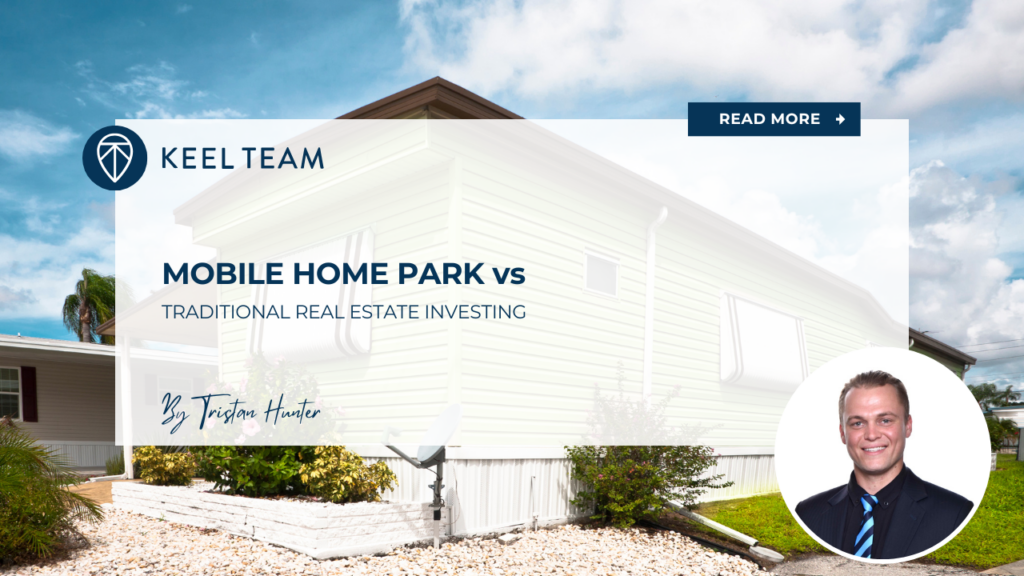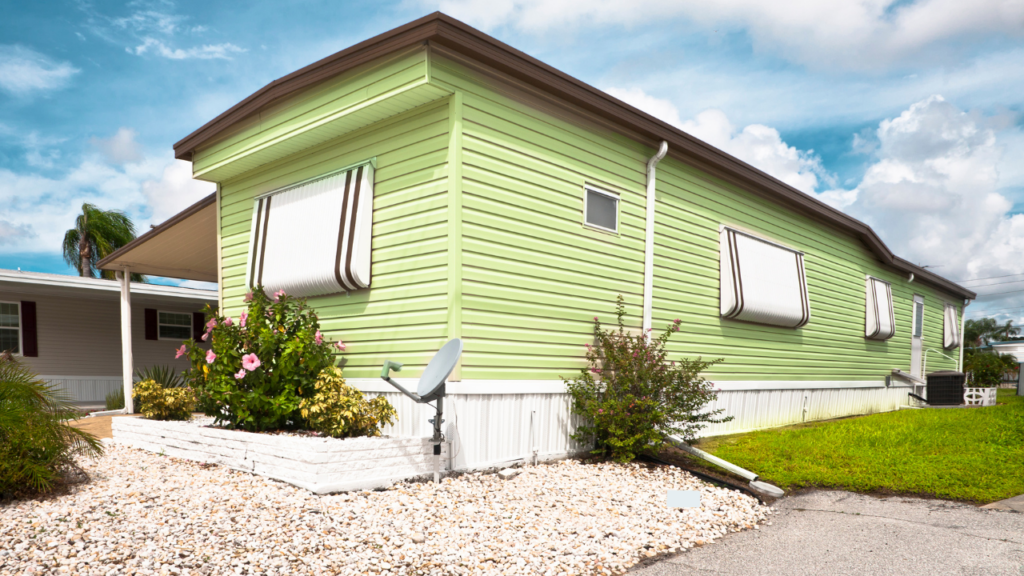Mobile Home Park vs Traditional Real Estate Investing
-
 Tristan Hunter - Investor Relations
Tristan Hunter - Investor Relations

Real estate investing offers various options, each with its advantages and challenges. Among these, mobile home parks, apartments, and single-family rentals are popular choices. Each asset class appeals to different investor goals and risk appetites. In this analysis, we’ll compare mobile home parks to traditional real estate, breaking down their common pros and cons to help investors better understand these opportunities.
Overview of Mobile Home Parks
Mobile home parks provide affordable housing solutions by leasing land to residents who own their homes. This model can reduce landlord responsibilities for housing maintenance while generating steady income potential. Mobile home parks often cater to underserved housing markets, which can create stable demand.
Overview of Traditional Real Estate Investing
Traditional real estate investments typically involve owning and managing apartments or single-family rentals. These assets generally generate income through tenant rents and may appreciate over time. However, they often come with more direct property management responsibilities, such as maintaining buildings and addressing tenant needs.
Download our FREE eBook on the Top 20 things to know BEFORE investing in mobile home parks!
Pros of Investing in Mobile Home Parks
1. Stable Tenant Base
Mobile home parks often attract long-term tenants. Since moving a mobile home can be costly, residents tend to stay for extended periods, which might lead to consistent cash flow. This stability could make mobile home parks attractive to investors seeking predictable income.
2. Lower Maintenance Costs
Mobile home park owners usually lease land rather than homes, so tenants are typically responsible for maintaining their homes. This structure might reduce maintenance costs and free up resources for other operational needs.
3. High Demand for Affordable Housing
Mobile home parks meet the growing demand for affordable housing. Economic challenges and rising home prices may increase the need for low-cost living options, which could benefit mobile home park investors.
4. Scalability
Mobile home parks often have multiple lots on one property, allowing investors to scale their operations more efficiently than purchasing multiple single-family homes. This model may streamline management and operational efforts.
5. Accelerated Depreciation
Mobile home parks often qualify for accelerated depreciation schedules compared to traditional apartments. The average depreciation period for mobile home parks is around 17 years, while apartments typically depreciate over 27.5 years. This faster depreciation may allow mobile home park investors to offset taxable income more effectively in the short term, potentially improving cash flow and tax benefits.
Cons of Investing in Mobile Home Parks
1. Zoning and Regulatory Challenges
Acquiring and managing mobile home parks might involve navigating zoning laws and local regulations, which can vary significantly. These requirements could complicate the investment process.
2. Limited Availability
Mobile home parks are less common than apartments or single-family homes. The limited supply might make it challenging to find investment opportunities in desirable locations.
3. Reputation and Stigma
Some mobile home parks face a stigma, which could affect market perception and tenant demographics. Investors might need to address these issues to attract and retain quality tenants.
4. Infrastructure Maintenance
While tenants maintain their homes, mobile home park owners are usually responsible for shared infrastructure, such as roads, utilities, and amenities. These costs can add up and require careful planning.
Pros of Traditional Real Estate Investing
1. Widespread Availability
Apartments and single-family rentals are widely available, offering diverse options for location and property type. This variety may make it easier to find opportunities that align with specific investment goals.
2. Appreciation Potential
Traditional real estate often appreciates in value over time. While this isn’t guaranteed, many investors aim to build equity through property appreciation and mortgage paydown.
3. Tax Benefits
Investing in traditional real estate may provide tax advantages, such as depreciation deductions and interest write-offs. These benefits could improve overall returns.
4. Flexibility in Management
Single-family homes and apartments usually offer flexibility in management styles. Owners can choose between self-management or hiring professional property managers, depending on their preferences and resources.

Cons of Traditional Real Estate Investing
1. Higher Turnover
Apartments and single-family rentals often experience higher tenant turnover rates compared to mobile home parks. Frequent turnovers can lead to increased costs for marketing, cleaning, and unit preparation.
2. Maintenance Responsibilities
Traditional real estate owners are responsible for maintaining the entire property. Repairs and renovations can be costly, especially in older buildings.
3. Market Sensitivity
Apartments and single-family rentals can be more sensitive to market conditions. Economic downturns or oversupply in rental markets might affect occupancy rates and rental income.
4. Management Complexity
Managing multiple units or properties can become complex, especially if they’re located in different areas. Investors often need robust systems or professional assistance to handle the workload.
Key Differences Between Mobile Home Park and Traditional Real Estate Investing
1. Tenant Ownership
In mobile home parks, tenants typically own their homes and lease the land, reducing landlord maintenance responsibilities. In traditional real estate, tenants rent the entire property, requiring the owner to manage repairs and upkeep.
2. Income Stability
Mobile home parks may offer more stable income due to long-term tenants. In contrast, traditional real estate might experience fluctuations in rental income due to higher turnover rates.
3. Entry Costs
Investing in mobile home parks might require a larger initial investment, as these properties often involve purchasing multiple lots. Single-family homes may offer a lower-cost entry point, making them accessible to new investors.
4. Demand Drivers
Mobile home parks often cater to affordable housing markets, while traditional real estate appeals to a broader range of tenants. Understanding these demand drivers can help align investments with market needs.
Considerations for Investors
When comparing mobile home parks to traditional real estate, investors might evaluate their goals, resources, and risk tolerance. Here are a few questions to consider:
- What is your preferred level of involvement?
- Mobile home parks might require less hands-on management due to tenant-maintained homes.
- Traditional real estate often involves more direct property management responsibilities.
- What is your target tenant demographic?
- Mobile home parks typically cater to affordable housing markets.
- Traditional real estate attracts a mix of tenants, depending on location and property type.
- How important is cash flow stability?
- Mobile home parks may offer stable cash flow potential through long-term tenants.
- Traditional real estate might experience higher fluctuations due to turnover.
- What are your long-term financial goals?
- Mobile home parks might provide consistent income with lower maintenance costs.
- Traditional real estate could offer appreciation potential and diversified tax benefits.
Conclusion
Both mobile home parks and traditional real estate have unique advantages and challenges. Mobile home parks may appeal to investors seeking stable cash flow potential and lower maintenance responsibilities, while traditional real estate could attract those looking for widespread availability and appreciation potential. By understanding these dynamics, investors can choose the option that best aligns with their goals and resources.
Are you looking for MORE information? Book a 1-on-1 consultation with Andrew Keel to discuss:
- A mobile home park deal review
- Due diligence questions
- How to raise capital from investors
- Mistakes to avoid, and more!
Disclaimer:
The information provided is for informational purposes only and is not investment advice or a guarantee of any kind. We do not guarantee profitability. Make investment decisions based on your own research and consult registered financial and legal professionals. We are not registered financial or legal professionals and do not provide personalized investment recommendations.

Tristan Hunter - Investor Relations
View The Previous or Next Post
Subscribe Below 👇





